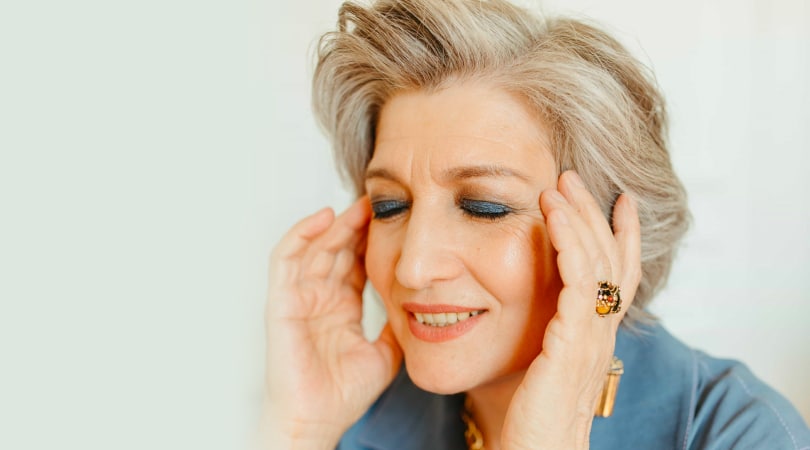
CBD for Menopause: Relief and Support
Menopause is a crucial and transforming phase in a woman’s life but it can bring some disruptive symptoms like hot flashes, mood swings, weight gain, and sleep problems that impact their daily routines.
While menopause symptoms aren’t curable, there’s growing interest in CBD as a potential aid for alleviating some of them; and year after year, more medical professionals are noticing women using CBD to manage their menopausal experiences.
Moreover, as cannabis products become legal, more people are eager to explore and take advantage of their potential benefits.
According to a 2022 survey led by Harvard University involving 258 participants –women going through menopause–, it was found that a significant majority (86.1%) acknowledged using cannabis. Additionally, a large portion (78.7%) expressed an interest in trying medical cannabis to alleviate symptoms associated with menopause.
But does CBD help with menopause? To find out, let’s first understand the typical symptoms of menopause. Then, we’ll see if CBD can help with specific symptoms like trouble sleeping, emotional changes linked to menopause, and joint pain. Lastly, we’ll discuss how to use CBD for managing these symptoms during menopause.
Common Menopause Symptoms

Menopause is a deeply personal journey, influenced by many factors like hormonal fluctuations, genetic predispositions, lifestyle choices, and dietary habits. These elements shape both the range and intensity of symptoms.
Having said that, some of the most common menopause symptoms include:
- Changes in Menstrual Patterns and Cessation: During menopause, periods become irregular before eventually stopping completely.
- Sudden Heat Waves (Hot Flashes): Quick and intense bursts of heat that can make you sweat and feel uncomfortable.
- Putting on Weight: Changes in hormones during menopause might make your weight go up and down, especially gaining more fat around the belly area. (Did you know that CBD has been linked to weight loss?)
- Vaginal Dryness: Lower estrogen levels can make the vagina less lubricated, making intimacy uncomfortable and affecting sexual health.
- Headaches: Some women might have more headaches during menopause, ranging from tension headaches to migraines.
- Joint Discomfort: Women can experience joint pain or existing joint problems getting worse.
- Mood Swings, Anxiety, and Depression: Hormonal shifts can affect brain chemicals, leading to mood swings, increased worries, and even episodes of depression for some women.
- Sleep Problems: Menopausal sleep problems can mean having a hard time falling asleep, staying asleep all night, or waking up too early and not being able to go back to sleep.
CBD for Menopause’s Insomnia
Sleep difficulties or interrupted rest are some of the most common complaints of women going through menopause, and CBD is thought to have the potential to relieve this symptom.
A study by The Permanente Journal looked at how CBD affects sleep. They studied 103 adults using CBD for anxiety and sleep issues along with other treatments. They found that 79.2% felt less anxious in the first month, and 66.7% said their sleep quality improved after the first month of using CBD.
Another study from 2021 reviewed 34 different studies on using CBD for insomnia. They found that many of these studies showed improvement in sleep problems. Some used mainly CBD, while others used a mix of CBD and THC, one of the most popular cannabinoids in cannabis. Both types showed good results for helping with sleep. However, it’s important to note that only a few studies focused specifically on people with insomnia.
If insomnia is one of the symptoms you are experiencing, you can learn here when & how to take CBD Oil for sleep.
CBD and Mental Health During Menopause
Emerging research suggests that CBD may offer relief for some of the psychological symptoms associated with menopause.
Anxiety: A study carried out by researchers at the New York University School of Medicine reviewed 49 different types of studies. These included brain imaging studies that looked at how anxiety impacts brain activity, as well as studies that checked how CBD affects anxiety symptoms in people.
The evidence gathered before actual human trials strongly suggests that CBD can help lessen anxiety behaviors associated with different types of conditions. Learn more about how CBD helps relieve anxiety.
Mood Changes: In a 2019 study, an extensive search across multiple databases was conducted to gather information from clinical trials, observational studies, or case reports focusing on how pure cannabidiol or CBD combined with other cannabinoids might impact mood symptoms related to mood disorders or other health conditions.
And, while there isn’t sufficient proof to fully support using cannabidiol as the main treatment for mood disorders, signs from research on different illnesses suggest it might have the potential to assist with these conditions.
Depression: A study in 2020 showed that in tests done on animals, CBD has various helpful effects like reducing anxiety, acting as an antidepressant, calming psychotic symptoms, preventing seizures, and protecting the brain.
In these tests, CBD worked a bit like an antidepressant, making animals feel better when given to them by itself or together with small doses of regular antidepressants.
Menopause Joint Pain and CBD

Menopause often brings joint pain due to lower estrogen levels causing inflammation. To find relief from this discomfort, Northwell Health conducted a study giving CBD to 428 participants who experienced joint pain from different causes, including both females and males from ages 18 to 65 and older. Here’s what they found after using CBD:
- 83% reported reduced pain.
- 66% experienced better physical function.
- 66% had improved sleep quality.
Overall, there was a significant 44% decrease in pain. Moreover, about 60.5% of participants reduced or stopped using other medications like anti-inflammatories, acetaminophen, and opioids after using CBD. This research suggests that CBD might be beneficial in alleviating joint pain and enhancing daily life for those dealing with menopause-related arthritis.
How to Use CBD for Menopause
Exploring CBD for menopause symptoms is ongoing, and much of the evidence is still based on personal experiences. However, there are indications that CBD might help ease some of the most troublesome symptoms associated with menopause.
When it comes to managing sleep problems and psychological menopause symptoms with CBD products, full-spectrum CBD oil is a great choice. It’s generally well-tolerated, rarely causes side effects, and doesn’t have any psychoactive effects, allowing for uninterrupted daily activities, and you can mix it into your tea or toss it in your food.
However, if you are dealing with joint pain, our Full-Spectrum CBD Salve for Chronic Pain is what you are looking for. You can directly apply it to your knees, elbows, or any joint where you feel pain for your skin to absorb the cannabidiol and relieve the pain.
Remember, it’s crucial to consult a healthcare professional before starting to use CBD for the first time, especially if you have existing medical conditions or take medications. While CBD holds promise for managing menopause symptoms, it’s wise to use it cautiously and with proper information.
The Bottom Line
Menopause, a significant transition for women, comes with its share of challenges. Yet, the emergence of CBD as a potential remedy sparks hope in easing troublesome symptoms like sleep disruptions, mood swings, and joint discomfort. Seeking guidance from healthcare professionals while considering CBD’s reported benefits is the best way to find relief during this period.
References
Blessing EM, Steenkamp MM, Manzanares J, Marmar CR. Cannabidiol as a Potential Treatment for Anxiety Disorders. Neurotherapeutics. 2015 Oct;12(4):825-36. doi: 10.1007/s13311-015-0387-1. PMID: 26341731; PMCID: PMC4604171.
Shannon S, Lewis N, Lee H, Hughes S. Cannabidiol in Anxiety and Sleep: A Large Case Series. Perm J. 2019;23:18-041. doi: 10.7812/TPP/18-041. PMID: 30624194; PMCID: PMC6326553.
Pinto JV, Saraf G, Frysch C, Vigo D, Keramatian K, Chakrabarty T, Lam RW, Kauer-Sant’Anna M, Yatham LN. Cannabidiol as a Treatment for Mood Disorders: A Systematic Review. Can J Psychiatry. 2020 Apr;65(4):213-227. doi: 10.1177/0706743719895195. Epub 2019 Dec 13. PMID: 31830820; PMCID: PMC7385425.
García-Gutiérrez MS, Navarrete F, Gasparyan A, Austrich-Olivares A, Sala F, Manzanares J. Cannabidiol: A Potential New Alternative for the Treatment of Anxiety, Depression, and Psychotic Disorders. Biomolecules. 2020 Nov 19;10(11):1575. doi: 10.3390/biom10111575. PMID: 33228239; PMCID: PMC7699613.
Frane N, Stapleton E, Iturriaga C, Ganz M, Rasquinha V, Duarte R. Cannabidiol as a treatment for arthritis and joint pain: an exploratory cross-sectional study. J Cannabis Res. 2022 Aug 24;4(1):47. doi: 10.1186/s42238-022-00154-9. PMID: 35999581; PMCID: PMC9400326.
Dahlgren, M. Kathryn PhD; El-Abboud, Celine BA; Lambros, Ashley M. BS; Sagar, Kelly A. PhD; Smith, Rosemary T. BS; Gruber, Staci A. PhD. A survey of medical cannabis use during perimenopause and postmenopause. Menopause 29(9):p 1028-1036, September 2022. | doi: 10.1097/GME.0000000000002018
Ranum RM, Whipple MO, Croghan I, Bauer B, Toussaint LL, Vincent A. Use of Cannabidiol in the Management of Insomnia: A Systematic Review. Cannabis Cannabinoid Res. 2023 Apr;8(2):213-229. doi: 10.1089/can.2022.0122. Epub 2022 Sep 23. PMID: 36149724.
